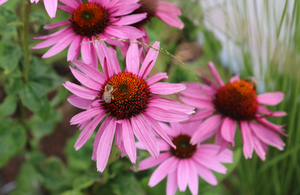Lord Gardiner visits the Carnaby Street pollinator paradise
Lord Gardiner visited Carnaby Street in London, a haven for bees, butterflies and other pollinating insects, during Bees' Needs Week 2017,

A West End shopping haven transformed into an insect super-highway has been hailed as an example of actions businesses and communities are taking across the country to help pollinators at the start of Bees’ Needs Week.
London’s Carnaby Street now has more than 700 hanging baskets, window box displays and planters to make the fashion hot spot as attractive to bees as it is to fashionistas.
Part of the Wild West End project, the move by property firm Shaftesbury to bedeck the iconic London landmark with thousands of nectar-rich flowers was championed by Pollinators Minister Lord Gardiner today to mark the start of Bees’ Needs Week.
Bees’ Needs Week – an annual event to promote the actions people can take to protect pollinating insects which this year takes place 17-23 June - will see a hive of activity across the country including a Pollination Day held by Kew Gardens and a series of bees and butterflies walks hosted by the Wildlife Trusts.
Minister for Pollinators and Biosecurity, Lord Gardiner, said:
Bees and other pollinators are not just a well-loved part of our cities, towns, villages and countryside – they are vital workers, driving our economy and boosting biodiversity.
Each of us can do our bit to help them flourish. Bees’ Needs Week is all about celebrating those across the nation who work throughout the year to help our pollinators, and encouraging more people of all ages to join in by taking simple actions such as planting bee-friendly flowers in a window box, letting your garden grow wild or not disturbing insect nests.
Our Bees’ Needs champions from Shaftesbury have done an excellent job turning Carnaby Street in to a paradise for pollinators. The project is a fine example of businesses working together and shows how landowners across the country can do their bit to help our bees.
Penny Thomas, Shaftesbury’s Company Secretary and lead on its biodiversity projects, said:
Pollinators, such as bees, are vital to the ecosystem and green features in the urban landscape – from sedum pods on roofs to window boxes with pollinator-friendly plants – encourage biodiversity and give residents, visitors and workers a chance to enjoy nature and improve health and well-being.
Bees, butterflies and other insects play a crucial role in our environment and our economy, with 1,500 species of insects pollinating crops in the UK, contributing an estimated £600m to our economy.
But many struggle to find the habitats and food they need. By thinking about Bees’ Needs and taking simple actions to meet them, people across the UK can help give bees and pollinators the food and shelter they need to survive.
Supporting the project for a third year, the Wildlife Trusts’ Director for England Steve Trotter said:
The Wildlife Trusts believe that everyone should have the opportunity to experience the joy of wildlife in their daily lives and bees are a fantastic way to make a start!
By understanding more about what bees need to survive we can help our precious bees to thrive.
Tim Lovett, Director of Communications at the British Beekeepers Association, said:
People need to do three things to help honeybees and pollinators - Plant! Plant! Plant! They need simple flowers that will provide a good source of nectar and pollen throughout the summer.
Bees’ Needs Week runs from 17-23 July in partnership with organisations including Friends of the Earth, the Bumblebee Conservation Trust and Royal Botanic Gardens Kew.
Bees’ Needs Week forms a key part of Defra’s wider National Pollinator Strategy, launched in 2014 in partnership with charities, businesses and academic institutions. It encourages people to take five simple actions to help pollinators:
-
grow more flowers, shrubs and trees
-
let your garden grow wild
-
cut grass less often
-
don’t disturb insect nests and hibernation spots
-
think carefully about whether to use pesticides
Get involved
- for more information on Bees’ Needs Week, events, and how you can get involved, click here
- follow #BeesNeeds on twitter to find out more about the campaign and tweet your pollinator questions to charities, businesses and bee experts
- build a bee hotel for your garden
Pollinators in numbers
- 1,500 species of insects pollinate plants in the UK, including bumble bees, honey bees, solitary bees, hoverflies, wasps, flies, beetles, butterflies and moths
- 25 species of bumble bee, 260 species of solitary bee, 1 honey bee species and hundreds of types of hoverflies, butterflies and moths live in the UK
- 70 of the 100 crop species that provide 90% of food worldwide are pollinated by bees.
- £600m is the estimated value of insect pollination to crops due to increases in yield and quality of seeds and fruit
- 46 hanging baskets, 49 planters, 660 window boxes, 6 green walls and 9 green roofs in Carnaby Street, as part of the Wild West End Project
- 5 simple actions the UK public can take to protect our vital pollinators: grow more flowers, shrubs and trees; leave patches of land to grow wild; cut grass less often; don’t disturb insect nests and hibernation spots; and think carefully about using pesticides